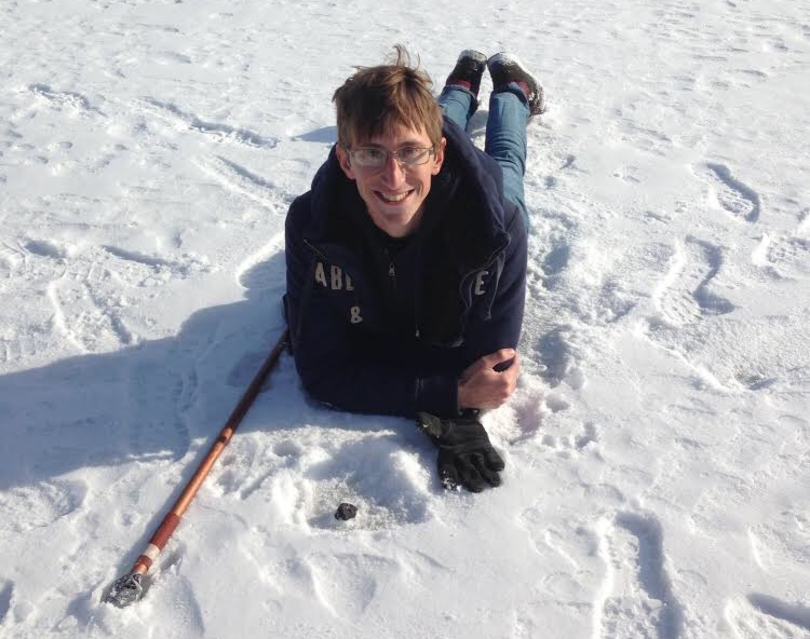RPI student fulfills dream of finding meteorite

Brandon Weller found a meteorite on Strawberry Lake in Hamburg Township, MI. He said he's interested in finding more meteorites in the future. Courtesy of Brandon Weller
On the afternoon of Jan. 17, Brandon Weller finished his last class of the day at Rensselaer Polytechnic Institute, just as he has done for the past three years. Instead of sleeping in his bed that Wednesday night, he drove eight hours to a small town north of Ann Arbor, Michigan. He was hoping to fulfill a lifelong dream of his: finding a meteorite.
A large meteor shower the night before scattered meteorites across southeast Michigan. Weller decided it was the perfect time to try to find one of his own.
“I had a rock collection growing up, and I just never stopped collecting,” Weller said. “Meteorites were always kind of on that list.”
For the past few months, Weller, a biology major from Chicago, has checked the website of the American Meteor Society daily, waiting for the right opportunity to look for meteorites. Once he realized the size of the meteor fall, he packed up and left RPI for the frozen lakes of southeast Michigan.
Frozen lakes are perfect for meteorite hunters, Weller explained, because the only rocks found on their snow-covered surfaces are likely meteorites.
Searching on Strawberry Lake in Hamburg Township on the night of Jan. 19, Weller fulfilled his dream. He approached a group of fellow meteor enthusiasts who were excited to display a meteorite that they had recently found.
“Knowing that, I searched the area much more thoroughly and found my fragment,” Weller recounted. But he still wasn’t satisfied.
Weller searched the rest of the weekend. Although unsuccessful this time, the biology major wasn’t disappointed.
“I was happy to find one, but I was always interested in finding more,” Weller said.
Pat Bickford, a professor emeritus of earth sciences at Syracuse University, said that while finding a meteorite is rare, the Earth’s atmosphere is constantly bombarded with meteors.
“There’s a continuous infall of meteoritic material, but most of it’s very, very tiny,” Bickford said. “The rare thing is one that’s big enough to survive passage through the atmosphere.”
Most meteorites that enter the Earth’s atmosphere burn up before reaching the planet’s surface, creating shooting stars.
Bickford said that, of those meteorites that make it to the ground, most land in desolate places like Antarctica and the Sahara Desert, further reducing the chances of finding a meteorite.
If they are found, meteorites can provide scientists interesting information on our solar system and the universe alike. This information can be found by determining the elemental composition of meteorites, which can be done “in exquisite detail” due to modern technology, Bickford explained.
Many of the minerals found in meteorites are also found in the Earth’s mantle and core.
“One of the reasons for studying meteorites,” Bickford said, “is to try to understand the bulk composition of the Earth, the part that we don’t see.”
This is this type of scientific analysis that Weller is currently conducting with a professor at RPI. Weller attributes his love for geology in part to his parents.
“My family has been awesome in all of this,” Weller explained. “A lot of kids have these weird hobbies and if their parents aren’t super supportive it doesn’t really go anywhere.”
In fact, Weller’s father initially informed him about the meteor shower, and his mother made hotel arrangements for his four-day search.
Weller, who will study medicine at Albany Medical College next year, wants to continue his geologic passions in the future, despite not being able to combine them with his medical pursuits.
“Geology just makes such an interesting hobby,” Weller said. “It’s something to go out and search for.”




